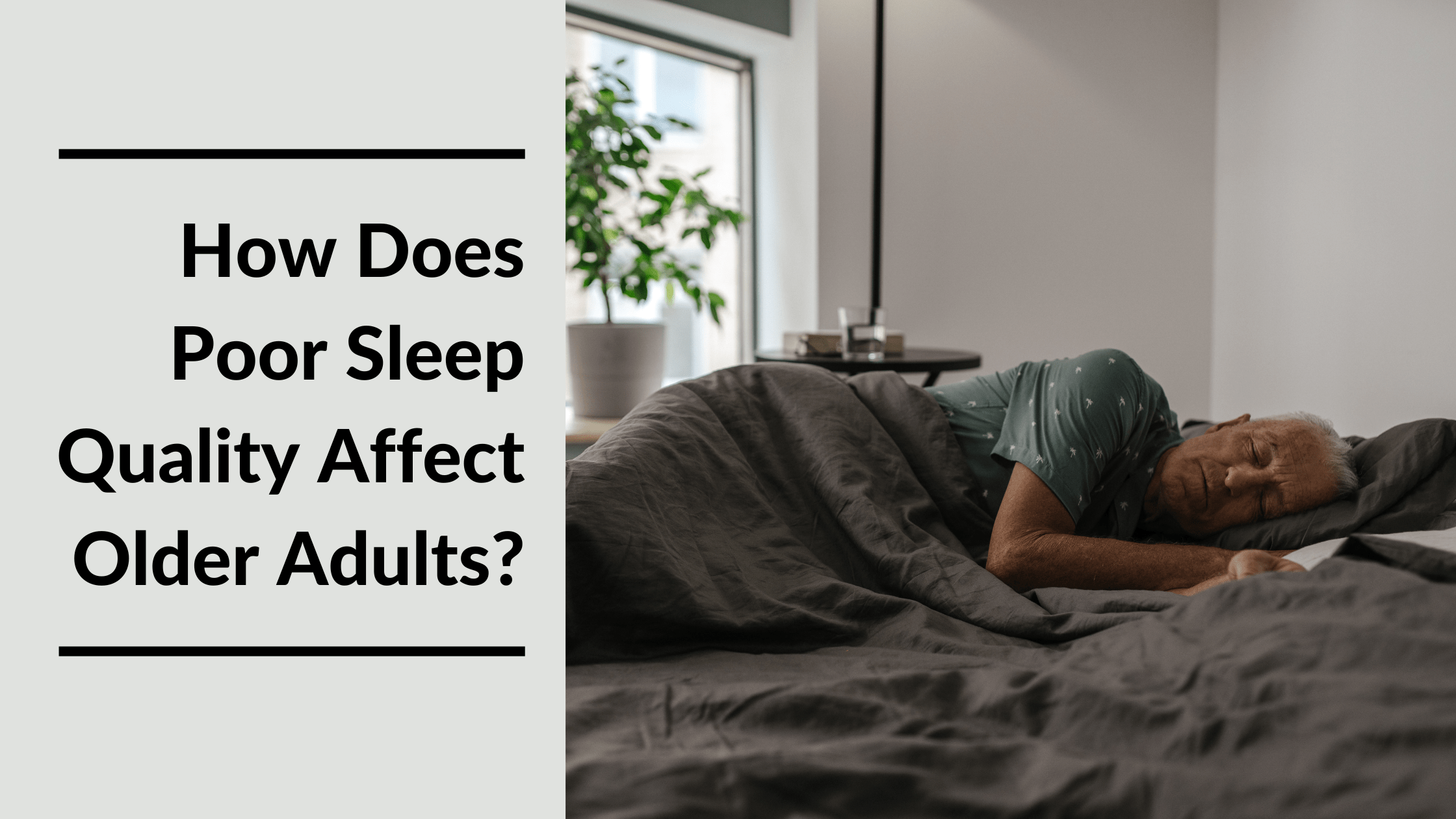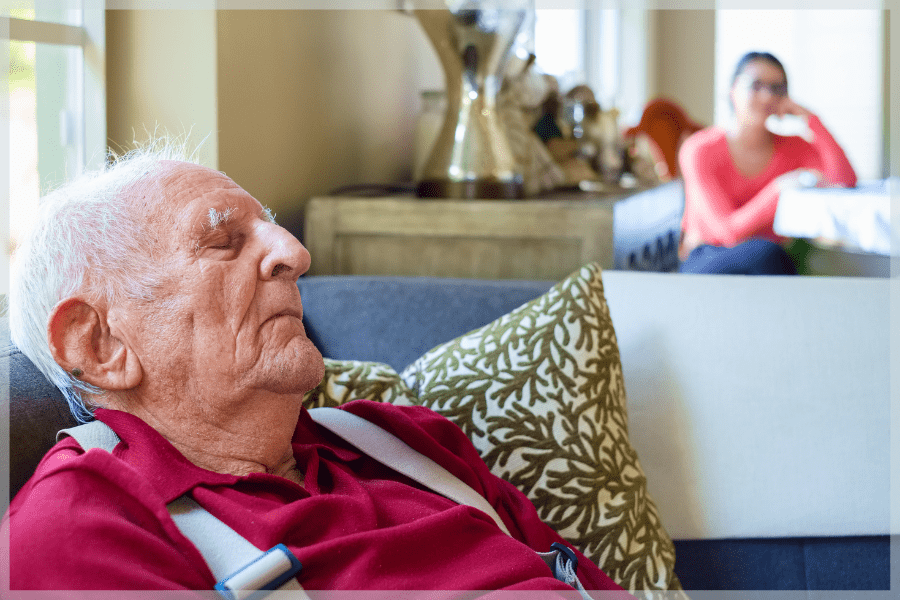
Aging brings numerous changes. Understanding the body’s changing sleep needs is one of the most vital things seniors can do to maintain their wellbeing. Quality rest is essential for everyone, but especially for older adults.
Updated January 30, 2023
What Are The Effects Of Poor Sleep Quality On Seniors?
Aging brings numerous changes. Understanding the body’s changing sleep needs is one of the most vital things seniors can do to maintain their wellbeing. Quality rest is essential for everyone, but especially for older adults.
Seniors need as much as children and teens (about 7 to 9 hours per night). During this time, the body completes about four to five REM sleep cycles. During REM sleep, the body stores memories, processes motions, and of course, dreams. Consistently missing REM sleep contributes to poor sleep quality, which can have several detrimental effects, such as:
- Cognitive difficulties (learning new things, remembering information, dementia)
- Mental and emotional health challenges (mood swings, depression)
- Physical issues (increased fall risk, poor balance, sugar cravings)
- New or worsening health conditions (diabetes, cancer, heart disease)
Studies show that the symptoms of sleep deprivation affect seniors more than any other age group. But despite this, most aren’t getting enough sleep, with 13% of men and 36% of women age 65 and older saying it takes them longer than 30 minutes to fall asleep.
A good night’s sleep usually means a minimum of seven hours of uninterrupted rest. However, sleep disturbances can affect the four to five REM cycles needed to store memories, process emotions, and dream.
Sleep deprivation can occur when people don’t get the necessary hours of rest and suffer from poor sleep quality. Sleep deprivation is one of the biggest detriments to anyone’s health and wellbeing because it affects almost every aspect of life.
What Causes Poor Sleep Quality In Seniors?
People of any age can struggle to fall and stay asleep. However, reduced melatonin production can contribute to poor sleep quality and make it especially difficult for seniors to meet their rest needs.
Melatonin is a hormone produced by the pineal gland when it gets dark. As we age, melatonin production slows. Decreased melatonin production means less time spent in REM sleep and a more difficult time falling into a deeper sleep state.
Melatonin also impacts the body’s circadian rhythm, which regulates waking and sleeping hours. Change in the circadian rhythm may be why older adults become tired earlier in the day and feel alert in the morning.
In addition to changes in sleep that naturally occur as we age, internal and external factors play a part in sleep health, such as:
- Stress: Aanxieties about aging, finances, a sedentary lifestyle, and more can all cause insomnia, which is not uncommon among seniors.
- Health issues: Sleep apnea and restless leg syndrome can make sleeping difficult. Researchers have found that seniors with no physical or psychiatric problems sleep better than those with these problems.
- Medications and substances: Prescription medicines, alcohol, and herbal supplements can all disrupt the REM cycle (when the body repairs itself and allows us to feel rested).

How To Improve Poor Sleep Quality
It’s no secret that a good night’s rest can do more than any amount of coffee. But did you know it could also improve your cognitive or even cardiovascular health? When you improve your sleep routine, you’ll experience benefits such as:
- Fewer depressive symptoms
- Greater alertness throughout the day
- Better balance and a lower chance of falls
- Increased attention span and memory
- Feeling happier and more engaged day-to-day
- Less reliance on certain substances or medications
- A more consistent appetite and fewer cravings for unhealthy foods.
As you can see, improving your sleep is one of the best things you can do for your body and quality of life. Fortunately, even if you have a history of sleep problems, you can take several steps to improve poor sleep quality:
- Follow a routine: Going to bed and waking up at around the same time each day, even if you slept poorly, will help regulate your body’s circadian rhythm. Aim for seven to nine hours of sleep and avoid going to bed too early or sleeping in too late.
- Limit screen time in the evening: TVs, tablets, phones, computers, and other devices emit blue light, which can confuse your body’s sleep and wake cycles. Avoid screens at least an hour before bed, and use a blue light filter on your devices whenever possible.
- Power naps: There’s nothing wrong with an afternoon nap. But the key is to sleep no longer than 20 minutes and avoid napping after 4:00 PM.
- Regular exercise: A sedentary lifestyle makes it challenging to feel tired at the end of the day. Check out indoor activities for seniors you can do in the comfort of your home.
- Meditation: With practice, mindfulness can help slow those racing night-time thoughts. Many free online apps and online videos are available to guide you through different meditation styles so you can sleep better.
- Avoid sleeping pills: Sleep aids can build tolerance and suppress REM cycles over time. Instead, try melatonin supplements, which come in a tablet or liquid form. Combined with routine bed- and wake times, melatonin will support your circadian rhythm’s ability to regulate your sleep cycle naturally.
It is important to discuss your sleep habits and routines with your healthcare provider, especially if a physical issue is interfering with your ability to sleep well.
MeetCaregivers Can Help
Seniors often struggle with poor sleep quality due to changes in melatonin production, which affects circadian rhythm and the sleep/wake cycle. However, other age-related factors, such as new or worsening health conditions or certain medications, can also contribute to poor sleep quality.
External factors can also play a role. For example, aging brings many changes that can be challenging to deal with. It’s common for seniors to worry about their finances, health, family, future, and more.
Finding affordable, dependable home care is one stressor that can keep seniors up at night, as many face numerous obstacles in obtaining these services. To help, MeetCaregivers is partnering with Medicare Advantage plans to provide in-home care as a supplemental benefit.
If you’re interested in home care services, call 1 (888) 541-1136 to talk to a care manager or get started and find a caregiver.
Visit our Blog for more information about aging in place, caregiving, and more.
- Cardozo, G. (2018, August 20). Senior’s sleep tips: your guide to getting good shut-eye. Senior’s sleep tips: your guide to getting good shut-eye | The Senior | Senior. Retrieved August 10, 2019, from https://www.thesenior.com.au/story/5541082/pillow-talk-sleep-tips-for-seniors/
Updated August 21, 2018 - Dixon, J. (2018, July 22). Seniors and sleep: Why seniors are often sleep deprived. Do Seniors Need Less Sleep? – WebMD. Retrieved August 10, 2019, from https://www.webmd.com/sleep-disorders/features/do-seniors-need-less-sleep#1
Medically Reviewed by Melinda Ratini, MS, DO on July 22, 2018. - goodcaregroup. (2019, November 11). The importance of sleep for older people. Retrieved August 10, 2019, from https://www.thegoodcaregroup.com/news/importance-sleep-older-people/
Updated November 19, 2022 - Kernisan, L. (2015, October 17). How Sleep Affects Health, & Changes With Aging. How Sleep Affects Health, and Changes with Aging. Retrieved August 10, 2019, from https://betterhealthwhileaging.net/how-sleep-affects-health-and-changes-with-aging/
Updated October 21, 2019 - Paprocki, J. (2013, August 7). Previous Next Sleep and Growing Older. Sleep and Growing Older | Tips for Older Adults | Sleep Education. Retrieved August 10, 2019, from http://sleepeducation.org/news/2013/08/07/sleep-and-growing-older
Updated July 13, 2022 - Suni, E. (2009, April 17). Melatonin and Sleep. Melatonin: An Overview | Sleep Foundation. Retrieved August 10, 2019, from https://www.sleepfoundation.org/articles/melatonin-and-sleep
Medically Reviewed by Alex Dimitriu, Psychiatrist. Updated on January 11, 2023 - Watson, S., & Cherney, K. (n.d.). The Effects of Sleep Deprivation on Your Body. 11 Effects of Sleep Deprivation on Your Body. Retrieved August 10, 2019, from https://www.healthline.com/health/sleep-deprivation/effects-on-body
Last medically reviewed on December 15, 2021.
